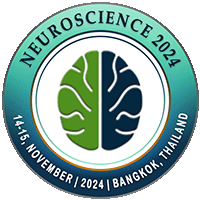
Ornanong Udomsirithamrong
Chiangmai Mai University, ThailandTitle: Study of Non-motor symptoms in Thai patients with primary focal or segmental dystonia: prevalence and impact on quality of life
Abstract
Objectives: To evaluate the prevalence of non-motor symptoms in patients with primary focal and segmental dystonia and their impact on QOL
Materials and Methods: Cross-Sectional Analytic Study. Forty-two patients age ? 18 years with primary focal or segmental dystonia was enrolled. Motor symptoms were evaluated by Fahn Marsden dystonia rating scale (FMDRS). Thai Hospital Anxiety and Depression Scale (HADS), Thai Montreal Cognitive Assessment scale (MoCA), Thai Pittsburgh Sleep Quality Index (PSQI), Visual Analogue Scale (VAS) were used to evaluate non-motor symptoms. QOL was assessed by WHOQOL-BREF-THAI.
Results: 10 patients (23.8%) had depression, 13 patients (31%) had anxiety, 36 patients (81%) had cognitive impairment, 33 patients (78.8%) had impaired quality of sleep, 30 patients (71.4%) had pain perception ranging from mild to severe which pain severity was found to have significant concordance to higher depression score, p value 0.005. FMDRS score was significantly associated with anxiety and sleep quality with p value 0.023 and 0.038 respectively, correlation coefficient was 0.349 and 0.321 respectively.
Overall QOL remained good in all patients, but 11 patients (26.2%) had poor QOL in social relationship domain and 2 patients (4.8%) had poor QOL in domain of physical and psychological. Depression, anxiety and impaired sleep quality had a significant impact on both overall and sub-domain of QOL with p value of 0.006, 0.001, 0.014 and contingency coefficient of -0.418, -0.508 and -0.375 respectively.
Conclusion: Prevalence of non-motor symptoms was high in focal and segmental dystonia and they have a larger impact on an individual's quality of life than that of motor symptoms.
Biography
Ornanong Udomsirithamrong has completed her Doctor of Medicine (M.D.) degree in 2014 and achieved a Diplomate of the Thai Board of Neurology in 2019 from Faculty of Chiangmai Mai University, Thailand.

